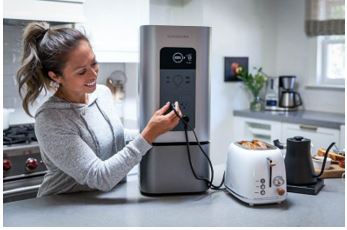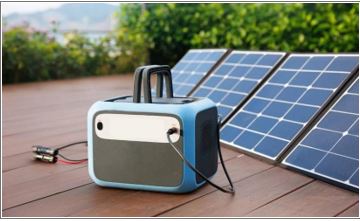Lightweight and portable, solar generators can use renewable energy to charge and power a variety of electronic devices. It’s also environmentally friendly, and unlike traditional generators, you don’t need to have a lot of fuel on hand. Ultimately, these questions remain – what is a solar generator and how does a solar generator work? Below, we will be answering these questions and will give you some information that you must know about solar generators.
What is a solar generator?
After all, the term photovoltaic can refer to any technology that can operate on the sun’s energy. But when people use the term “solar power”, it almost always refers to the installation of portable power stations. These special systems can catch solar energy through integrated solar panels and transfer it to their internal storage systems. Solar power isn’t always the right solution for large homes, but it can be very useful for boats, and RVs, or as a backup power source in the event of a power outage in your area.
How do Solar Generators Work?
Solar creators can give off-grid power for long ages without taking anything other than the sun. Solar generators offer an environmentally friendly power generation solution and are often as effective or more effective than propane or gas generators. Solar generators function by incorporating solar panels, battery systems, inverters, and charge controllers into a compact system to convert solar energy into usable power. Why is solar power essential? As more and more of our population rely on these technologies to survive and stay connected to the world each year, it becomes more important to have backup power in our homes.
Each Component Separately
- Charge controller:
An important part of solar power generation, it is mainly used to protect the battery and extend its life. Charge controllers typically have different charging and discharging capabilities depending on the specific battery and solar panel combination you are using. This component is fundamental to the solar generator’s operation as it balances the power dynamics between the battery and the solar panel.
- Battery:
A solar generator must store the energy it collects from the sun for later use. The battery acts as a storage unit. Lithium-ion batteries have been used in various photovoltaic devices since around 2016. However, it is also possible to use less efficient lead-acid batteries, which are cheaper and more widely available than lithium-ion technology. However, lithium-ion batteries have significant advantages over lead-acid batteries, and in the long run, we recommend using lithium-ion batteries as they are safer and more affordable.
- Inverter:
This component converts the battery’s low-level direct current (DC) to alternating current (AC), which can be used to power everyday household items. Equipment that requires direct current does not need an inverter because it does not need to convert the current.
Should I buy a solar generator?

If your main purpose is to power small devices like the one on your boat or RV, a solar generator would be a great option. Solar generators are easy to transport and operate, providing a unique energy solution for on-the-go customers who need extra power. However, it has some drawbacks, such as limited energy capacity, slow charging times, and reliance on the sun. All this limits the technology’s usefulness as a backup power system for the entire home.
Final Thoughts
Solar power is a smart alternative to traditional gas generators and is smokeless and quiet. It produces no harmful emissions, reduces your carbon footprint, and enables flexible indoor and outdoor operation. If you want to help the environment, the best solution that you can do is to switch to solar generators today.
